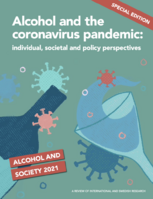"The coronavirus crisis has brought into sharp focus the health, economic and social burden that alcohol places on our societies,” says Kristina Sperkova, International President of Movendi International, one of the civil society organisations that have collaborated in publishing the report.
"We see that alcohol harm is draining scarce resources from our communities and that alcohol burdens the healthcare system heavily. Unfortunately, as the report shows, not enough governments have opened their eyes – yet – to that reality."
Individual level effects
The researchers have reviewed international and Swedish research. They show how alcohol may increase the risk of COVID-19 infection and, for those infected, increase symptom severity. This is related to alcohol’s detrimental effect on the immune system and specific organ and body systems. In addition, increased risk for COVID-19 infection is related to behavioural effects of drinkers and characteristics of drinking settings or contexts.
The researchers sum up some of their findings:
“COVID-19 is obviously a major risk to health and, as this report has shown, this may be exacerbated by alcohol exposure through a range of physiological actions including alcohol’s effect on the immune system and its link to other risk factors such as diabetes, heart, lung, liver and digestive disease. Drinking has also played a central role in the transmission of COVID-19 between individuals and across populations both through poor decision-making while drinking and exposure to the virus in public drinking settings such as restaurants, bars, clubs, sporting events, and other gatherings.”
Population level alcohol use
All around the world the pandemic has changed the way people live and interact. Lockdowns and other restrictions have followed the pandemic, and this has led to differences also in drinking patterns. The researchers have evaluated the information so far (about six months into the pandemic) about changes in consumption or patterns of alcohol use. They find it is premature to conclusively determine, or to easily characterize these changes, but describe some of the information that is available. The various COVID-19 measures have “affected locations and patterns of drinking by both men and women and in some cases increased the risk of problems for which alcohol already has a major role such as domestic violence and mental health problems,” the researchers point out.
Government responses
The report also analyses how governments’ responses to alcohol in the face of the Corona threat have taken different forms, from strong restrictions or total bans, to declaring alcohol an essential item when other sectors have been locked down. Common restrictive alcohol policy changes include limits or bans on the ‘on-trade’ – closing bars and/or restricting alcohol in restaurants or shortening the opening hours of such premises. Similarly, some liberalisation has also been seen, including liberalizing the internet sale and home delivery of alcohol in places where that has been restricted previously.
The report describes how, in the policy space, the alcohol industry has been active to lobby for its interests, both to avoid more restrictive policy, achieve liberalisation in areas that have been affected by the pandemic regulations, and brokering for more lasting policy changes (tax relief etc.). Often the involvement of industry with a vested interest in the sales of alcohol is presented in terms of partnerships with governments. The report points out how “Governments of developing and low income countries appear particularly susceptible to interference by commercial vested interests, although high income country governments are by no means immune.”
Recommendations
The researchers conclude by giving recommendations both to governments and to individuals on how to handle the interface between alcohol and COVID-19. Governments should sustain and strengthen established alcohol regulation including key controls on physical and economic availability. Where concessions to industry have occurred, pre-pandemic regulations should be restored without delay. In the face of the pandemic governments should move quickly to implement a suit of temporary alcohol-related restrictions aimed at reducing transmission and reducing alcohol’s direct and indirect contribution to the total burden on health care services.
Recommendations to individual may be interpreted as ‘less is better’.
The report is written by a group of researchers from Sweden, Australia, Canada, and USA: Sven Andreasson, Tanya Chikritzhs, Frida Dangardt, Harold Holder, Timothy Naimi, Adam Sherk, and Tim Stockwell. It was initiated and published by several voluntary or academic organisations in Sweden, including the Swedish Society of Nursing, SFAM, SAFF, CERA, The Swedish Society of Addiction Medicine, SIGHT, Movendi International and IOGT-NTO.

